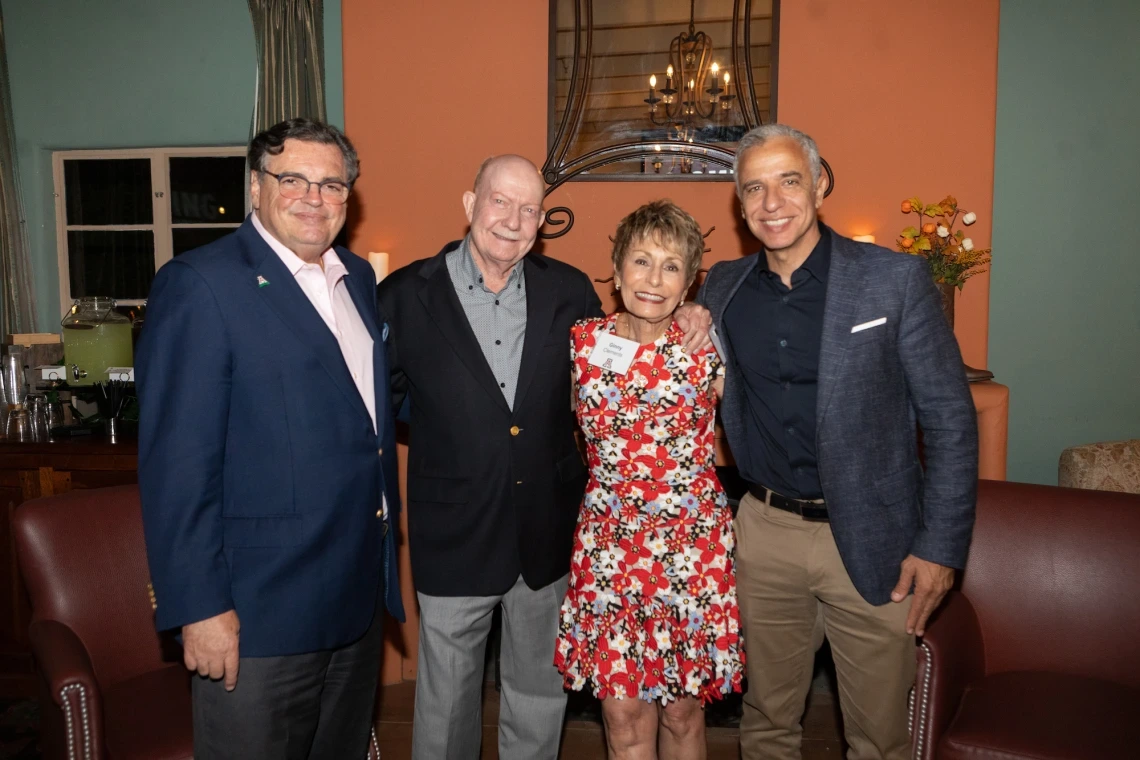Sarver Heart Center receives $2M in gifts toward founding of cardiovascular research institute

From left: Michael Abecassis, dean of the U of A College of Medicine – Tucson, with Tom Rogers, Ginny L. Clements and Hesham Sadek.
Philanthropist and businesswoman Ginny L. Clements and her husband, manufacturing executive Tom Rogers, have each committed gifts of $1 million to the Sarver Heart Center at the University of Arizona College of Medicine – Tucson to create a new cardiovascular research institute.
The Sarver Heart Center has set a goal to raise $75 million to build an institutionally designated cardiovascular research institute, pending approval by the Arizona Board of Regents. Thanks to the generosity of another donor, a challenge gift has been committed to support the project with a match of $25 million when the college raises $50 million over five years. The $2 million will help the college meet the fundraising commitment requirement for the first year of the challenge gift.
The Sarver Heart Center was originally founded as the University Heart Center in 1986 with the goal of preventing and curing cardiovascular disease through academic and clinical advancements. Today, more than 160 researchers and physician-scientists are working collaboratively toward a future free of heart disease, vascular disease and stroke.
"My dad, uncle and aunt all died of heart disease, so it was a no-brainer when I was asked to make a donation to the Sarver Heart Center to create a new cardiovascular research institute," Clements said. "I am extremely blessed that I am able to be a part of their journey, as I truly believe that extensive research is the only answer to cure many diseases."
Clements' gift continues a commitment to supporting U of A research. In 2020, Clements gave $8.5 million to the to establish the Ginny L. Clements Breast Cancer Research Institute and strengthen the University of Arizona Cancer Center's breast cancer patient care and research programs. Prior to that, she created the Ginny L. Clements Breast Cancer Research Fund, also at the Cancer Center.
Plans for the cardiovascular research institute, in partnership with Banner – University Medical Center Tucson, include providing researchers with a powerful new platform to explore ways to maintain heart health, and to prevent, diagnose and treat cardiovascular disease.
"Ginny and I both feel very blessed to be able to invest in the future growth of the Sarver Heart Center at the University of Arizona College of Medicine by helping Dr. Abecassis to fund the cardiovascular research institute," Rogers said. "We feel the research at this institute will have the capability of saving thousands of lives not only in Arizona but throughout the world and further advance the standing of the University of Arizona as a leader in medical research."
"There are currently no comprehensive institutionally designated cardiovascular research institutes in the Southwest, and the U of A College of Medicine – Tucson's SHC is well positioned to create a path toward a CRI that elevates the Sarver Heart Center as a leader in the fight against cardiovascular disease," said Michael M.I. Abecassis, MD, MBA, the Humberto and Czarina Lopez Endowed Dean of the College of Medicine – Tucson. "Revitalizing the SHC through an infusion of investments will help us advance its vision, which is embedded in COM-T's tripartite mission of education, research and patient care. Thanks to the generosity of Ginny and Tom, the CRI will allow us to translate innovation into clinical destination programs, through the unrelenting pursuit of new ways to prevent, diagnose and treat cardiovascular disease."
The funds will help recruit top academic talent in the specific areas of heart regeneration, heart failure and transplantation, and the prevention and management of atherosclerosis with a focus on vascular biology.
"We are incredibly thankful for these gifts that will help us make the Sarver Heart Center the nation's premier destination for research, innovation, training and patient care in heart health," said Hesham Sadek, MD, PhD, director of the Sarver Heart Center and chief of the Division of Cardiology. "These generous gifts will be a critical building block of our new cardiovascular institute, which will deliver state of the art precision medicine innovations for patients suffering from cardiovascular disease."
Additionally, the gifts will help build an interdisciplinary research program, develop infrastructure and acquire equipment.
"Thanks to the generosity of Ginny and Tom, the College of Medicine – Tucson is poised to create a cardiovascular research institute that elevates the Sarver Heart Center into a leading role in the fight against cardiovascular disease in the U.S. and beyond," said Michael D. Dake, MD, senior vice president for U of A Health Sciences. "We are deeply thankful for their gifts, which will allow us to investigate and solve critical cardiovascular issues and provide compassionate care while building healthier communities for all."
According to the U.S. Centers for Disease Control and Prevention, in 2022 more than 700,000 people in the U.S. died from heart disease, which is the equivalent of 1 in every 5 deaths. Globally, heart disease was responsible for 17.9 million deaths in 2019, or more than 32% of all deaths, according to the World Health Organization.
"I'm so grateful for the longtime support of Ginny and Tom," said John-Paul Roczniak, president and CEO of the University of Arizona Foundation. "On a personal note, I have to say how special they are to this community and university – their investment in making a positive impact through their giving is inspiring. These gifts to support cardiovascular research are just the latest example of philanthropy meant to meaningfully improve people's lives."
The $2 million in gift commitments are part of the Fuel Wonder campaign, the university's $3 billion fundraising effort. Gifts already made to the campaign are giving every student access to a cohesive ecosystem of support, powering new insights into the human immunome and transforming research in areas including cancer, engineering, space sciences and the humanities.

